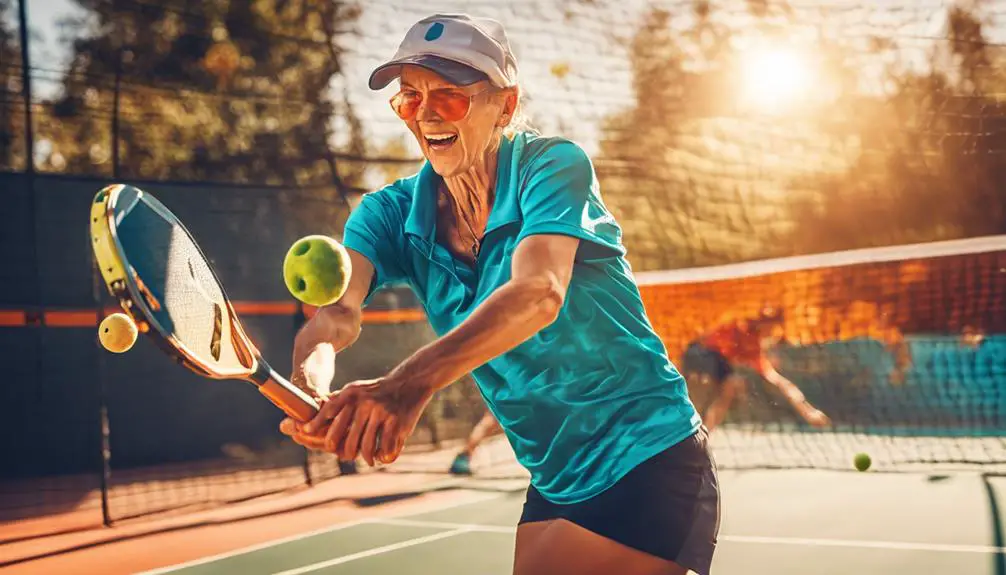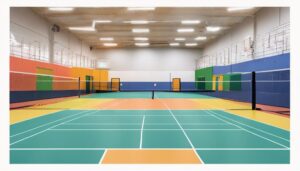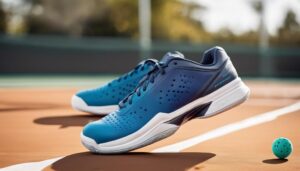Yes, you can hit overhand shots in pickleball. Just make sure your paddle is above your head when you do so. This technique can enhance your game by increasing power and creating strategic angles that challenge your opponent. Keep in mind, you can’t hit these shots if you’re in the non-volley zone, and it’s best to wait for the ball to bounce first. Timing, footwork, and a firm yet relaxed grip are key to mastering this skill. You’ll find that perfecting your overhand technique can greatly impact your performance, and there’s more to explore on this topic.
Understanding Overhand Shots
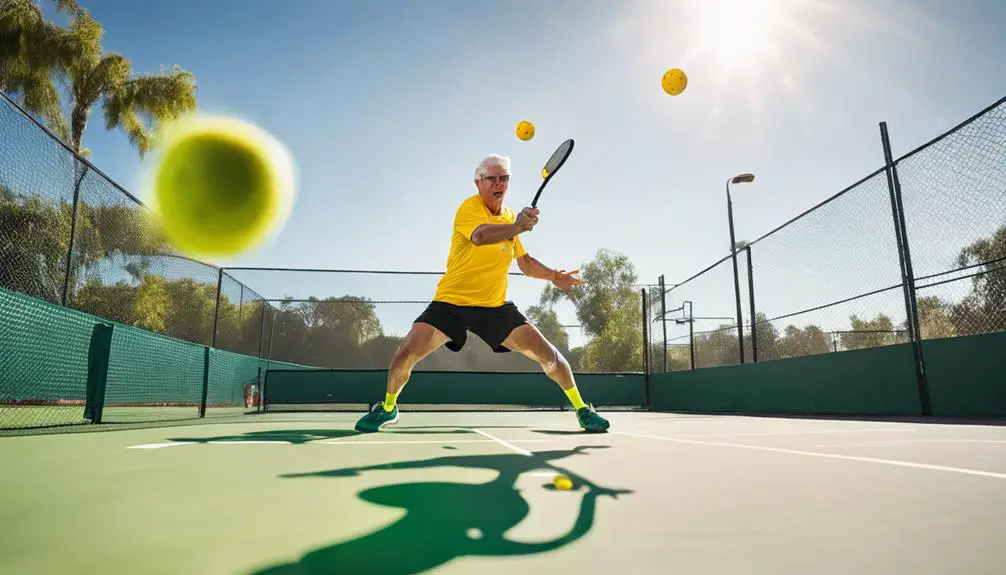
Understanding overhand shots in pickleball begins with recognizing their unique role in the game. These shots can be game-changers, allowing you to take control of points and dictate play. Mastering overhand mechanics is essential for effective execution. You want to guarantee your grip is firm yet relaxed, allowing for fluid movement through your swing. A strong follow-through helps generate power and accuracy, vital elements in shot placement.
When you prepare for an overhand shot, consider the angle of your paddle and your body positioning. A well-timed jump can elevate your shot, adding a layer of difficulty for your opponent. As you swing, focus on making contact at the ideal height to maximize both power and precision. Understanding your opponent’s positioning can help you decide whether to target their backhand or exploit open spaces on the court.
Shot placement is key; you don’t just want to hit the ball hard, but you also want it to land where it’s least expected. Aim for the corners or deep into the opponent’s court to keep them on their toes. A well-placed overhand shot can force errors or create opportunities for winning volleys.
Rules Governing Overhand Hits
In pickleball, the rules governing overhand hits are vital for maintaining fair play and guaranteeing that every player can showcase their skills. Understanding the overhand legality is imperative to prevent confusion during a match. Here’s a breakdown of the key rules you should keep in mind:
- Height Requirement: Overhand shots must be executed with the paddle above the player’s head. This distinction helps categorize them from standard groundstrokes or underhand shots.
- Service Rules: When serving, an overhand hit isn’t allowed. The serve must be made underhand, emphasizing the diversity of shot variations in pickleball.
- Non-Volley Zone: You can’t hit an overhand shot while standing in the non-volley zone (also known as the kitchen). This rule prevents players from gaining an unfair advantage at the net.
- Ball Bounce: If the ball bounces before you hit an overhand shot, you’re allowed to take it above your head. However, if it’s in the air, you must ensure you’re not violating the non-volley zone rule while doing so.
Following these guidelines will help you navigate the intricacies of overhand hits effectively. Embracing these rules not only enhances your game but also upholds the spirit of pickleball, allowing you to enjoy the freedom of expression through your chosen shot variations.
Benefits of Overhand Techniques
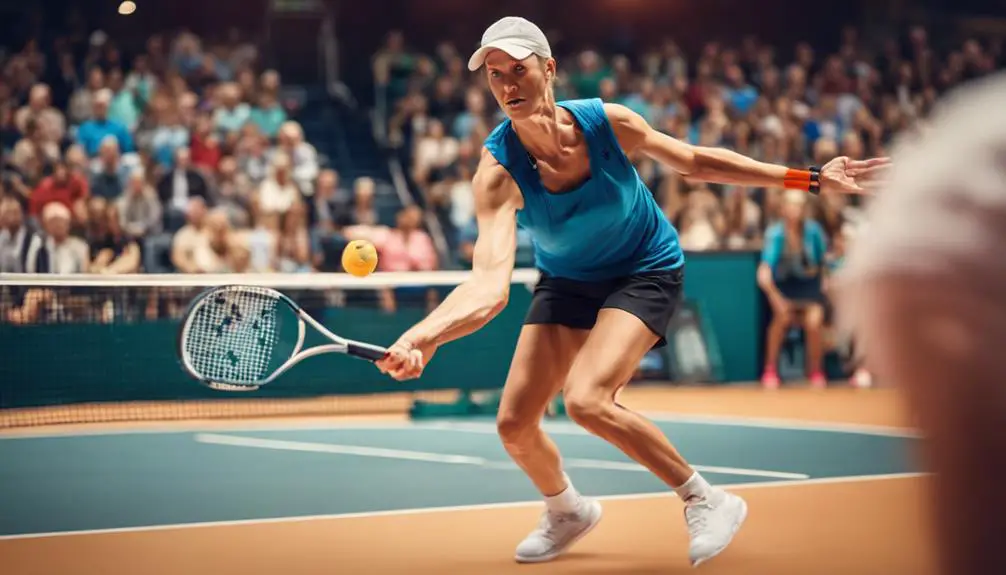
Mastering overhand techniques can greatly enhance your pickleball game. When you incorporate overhand hits into your play, you reveal several overhand advantages that can give you an edge over your opponents. Not only do these techniques add power to your shots, but they also allow for better strategic placement, enabling you to dictate the pace of the game.
Here’s a quick overview of the benefits:
| Benefit | Description | Impact on Game |
|---|---|---|
| Increased Power | Overhand strokes generate more force. | Makes it harder for opponents to return. |
| Improved Angles | You can hit at sharper angles. | Forces your opponent into difficult positions. |
| Enhanced Reach | You can cover more court area effectively. | Allows for better court control. |
| Versatile Shot Options | Mix up your shots with topspin, slice, etc. | Keeps your opponents guessing. |
| Greater Offensive Play | Initiate points with strong attacking shots. | Sets the tone for aggressive play. |
Common Mistakes to Avoid
Many players make vital mistakes when attempting overhand shots in pickleball that can undermine their effectiveness. Understanding common pitfalls is important for improving your game. Here are four mistakes to avoid that can impact your overhand techniques and shot selection:
- Poor Timing: Hitting the ball too early or too late can lead to inaccurate shots. Focus on your opponent’s position and the ball’s trajectory to guarantee you’re swinging at the right moment.
- Neglecting Footwork: Footwork plays a significant role in executing a successful overhand shot. Don’t remain stationary; move into position to generate power and accuracy. Maintain a balanced stance to enhance your shot.
- Inconsistent Grip: A weak or inconsistent grip can result in a lack of control. Make sure you’re holding the paddle firmly but not overly tight. Experiment with different grips to find one that feels right for your style.
- Ignoring Shot Selection: Not every situation calls for an overhand shot. Assess your options based on your opponent’s position and the ball’s height. Sometimes, a quick soft shot or a strategic placement is more effective than a powerful overhand.
Tips for Effective Overhand Shots
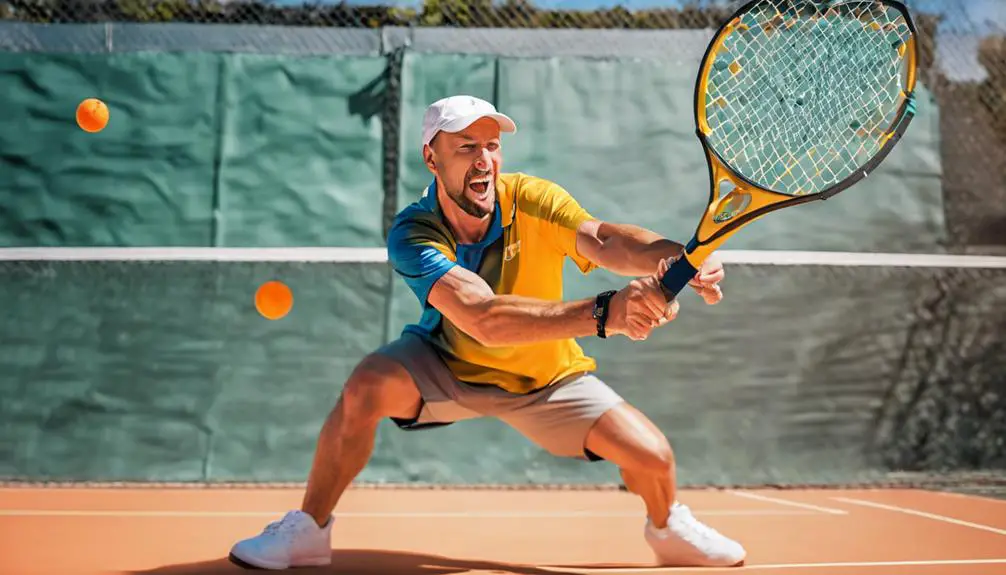
When it comes to executing effective overhand shots in pickleball, a combination of technique and strategy can make all the difference. To start, mastering the overhand grip is essential. Hold your paddle with a firm yet relaxed grip, ensuring your thumb is positioned on the back for stability. This grip allows for better control and power, enabling you to strike the ball cleanly.
Next, focus on your stance and positioning. Stand with your feet shoulder-width apart, knees slightly bent, and shift your weight to your back foot as you prepare to hit. As the ball approaches, pivot your hips forward and transfer your weight onto your front foot. This movement generates power and helps you maintain balance.
Shot placement can turn an ordinary overhand into a winning shot. Aim for the corners of the court or the opponent’s weaker side, making it harder for them to return the ball. Practicing different angles and heights can also keep your opponents guessing, giving you a strategic advantage.
Practicing Overhand Skills
Practicing overhand skills in pickleball is essential for elevating your game and gaining a competitive edge. To master these shots, you’ll want to focus on structured overhand drills that promote skill progression. Here are four effective drills to get you started:
- Shadow Swings: Without a ball, practice your overhand motion to develop muscle memory. Focus on your grip, stance, and follow-through. This’ll help you build confidence before hitting real shots.
- Target Practice: Set up targets on the court and aim for them using your overhand shots. This’ll enhance your accuracy and control, key components for successful gameplay.
- Partner Drills: Work with a partner to practice your overhand shots. Have them feed you balls at varying heights and speeds, allowing you to adapt and improve your timing and footwork.
- Game Scenarios: Simulate real match situations by incorporating overhand shots into practice games. This’ll help you learn when to utilize your overhand skills effectively during actual play.
Integrating these overhand drills into your practice routine will not only strengthen your skills but also enhance your overall performance. As you progress, pay attention to your technique and adjust based on what feels comfortable. Embrace the challenge, and remember that dedicated practice is key to mastering any skill in pickleball. With time and effort, your overhand game will flourish, giving you the freedom to dominate the court.
Frequently Asked Questions
Can Beginners Successfully Learn Overhand Shots in Pickleball?
Can you imagine mastering overhand shots as a beginner? With proper overhand technique and beginner tips, you can develop your skills, gain confidence, and enjoy the freedom of playing pickleball at a higher level.
What Equipment Is Best for Practicing Overhand Hits?
To practice overhand hits, you’ll want quality pickleball paddles for control and practice balls that mimic game conditions. This setup helps you refine your technique, boosting your confidence and skills on the court. Enjoy your practice!
Are There Specific Drills to Improve Overhand Techniques?
Isn’t it amazing how mastering overhand techniques can elevate your game? Focus on specific overhand drills for technique refinement, like shadow swings and targeted tosses, to enhance your skills and release your potential on the court.
How Does Foot Placement Affect Overhand Shot Success?
Foot positioning and body alignment play essential roles in your overhand shot success. Properly aligning your feet allows for better balance and power, while correct body positioning enhances your reach and accuracy when striking the ball.
Can Overhand Shots Be Used Defensively in Pickleball?
Absolutely, overhand shots can be effective defensively. By mastering overhand strategies and maintaining proper defensive positioning, you can counter opponents’ attacks, regain control, and create opportunities for strategic plays, ensuring you stay in the game.

